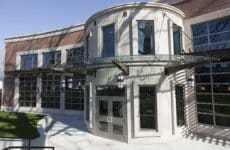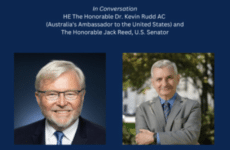By: Alexandra Riewer
Posted In: News

Photo credit: Alexandra Riewer
Amandra Frye Leinhos, executive director of the Martin Luther King Junior Center
Amandra Frye Leinhos sure knows why she is serving the public, not to mention she is proud of it. Having been executive director of the Martin Luther King, Junior Center since 1999, she talks positively about the center’s success at serving the Newport community since it’s opening in 1922. The center offers after-school programs for grades K-12 and provides food for the hungry. Make some room Michelle; there’s another leading-lady in town.
Q: The center’s programs have risen dramatically in success since 1999. Can you talk about this success and the significant revisions you’ve implemented? A: The circumstances of the community have changed radically over the last 10 years and we have been efficient about keeping up with those needs. The major sources of food are the Rhode Island Community Food Bank and the USDA Commodity Foods Network. The supply of food is incredibly cut from what it was ten years ago, so we’re not able to get nearly as much from them. Our success has been in responding to the change in community need and from those entities. Q: How has the recession affected the number of families who utilize the food pantry? A: The frequency which people are using the food pantry is really the issue. People that used to come once a year are coming once a quarter. People that used to come once a quarter are coming once a month. We try to organize the food pantry so people leave here with five days worth of meals to be able to get over the immediate crisis. As far as donations, there has been an increase in participation in the food drives. On the financial side, a lot of our major funders have less money to play with. But we’ve also seen a numerical increase in the number of individual donors. Q: How have the after-school programs fared with regards to resource availability such as tutors, text books, and computers? A: We try to invest wisely in resources when we have the opportunity to do so. We’ve had an increase in the number of people who have wanted to volunteer as tutors. When people don’t have the money to give, they volunteer their time. As far as books and consumable supplies, we try to raise funds to purchase those things. We just received a donation of about 15 or 16 boxes from our friends at the Newport Library. Also, we do the middle school program very different now. Originally, the program was tacked onto the elementary program and was not very well attended. We re-launched our middle school program as a component of the teen center to smooth the transition. It gives us the opportunity to put kids into advanced leadership development positions. We went from a handful of kids attending everyday to 25 to 30 average daily attendances with a roster of 45 kids. Q: Do you have the opportunity to provide graduating high school students with college scholarships? A: We have a scholarship program in two tiers: the graduating senior and the continuing student. We try to offer at least one $500 scholarship a year. Generally, that has been more like $2,500 in scholarships when we’ve been able to raise the money. Q: Would you say the educational services or food bank services have been most affected by the economy? A: Both, in different ways. With the childcare services, we have needed to be a lot more flexible because families have to be way more creative to figure “how do I keep my job and get some form of childcare so I can be at work and know my kid is in a safe environment?” Kids who used to come five days a week now come three. It does put pressure on us financially to come up with the funds to make up the difference. Q: What is the best, most direct or effective way for the community to donate? A: Write a check and put it in the mail (laughs). We are in need of time, talent and treasure. A place like this could not run without volunteers. Food donations are also important because it relieves us from purchasing food. Q: In spite of all these issues, where you do see the future of the center a year from now? A: Ninety years from now we will still be here. Because we are non-profit, we are able to stop on a dime and change what we are doing in order to continue to meet the needs of the community. Q: What would you tell the President Barack Obama, or to Congress, who’s just frozen domestic programs? A: I think I would say “remember why you wanted to serve the public.”













